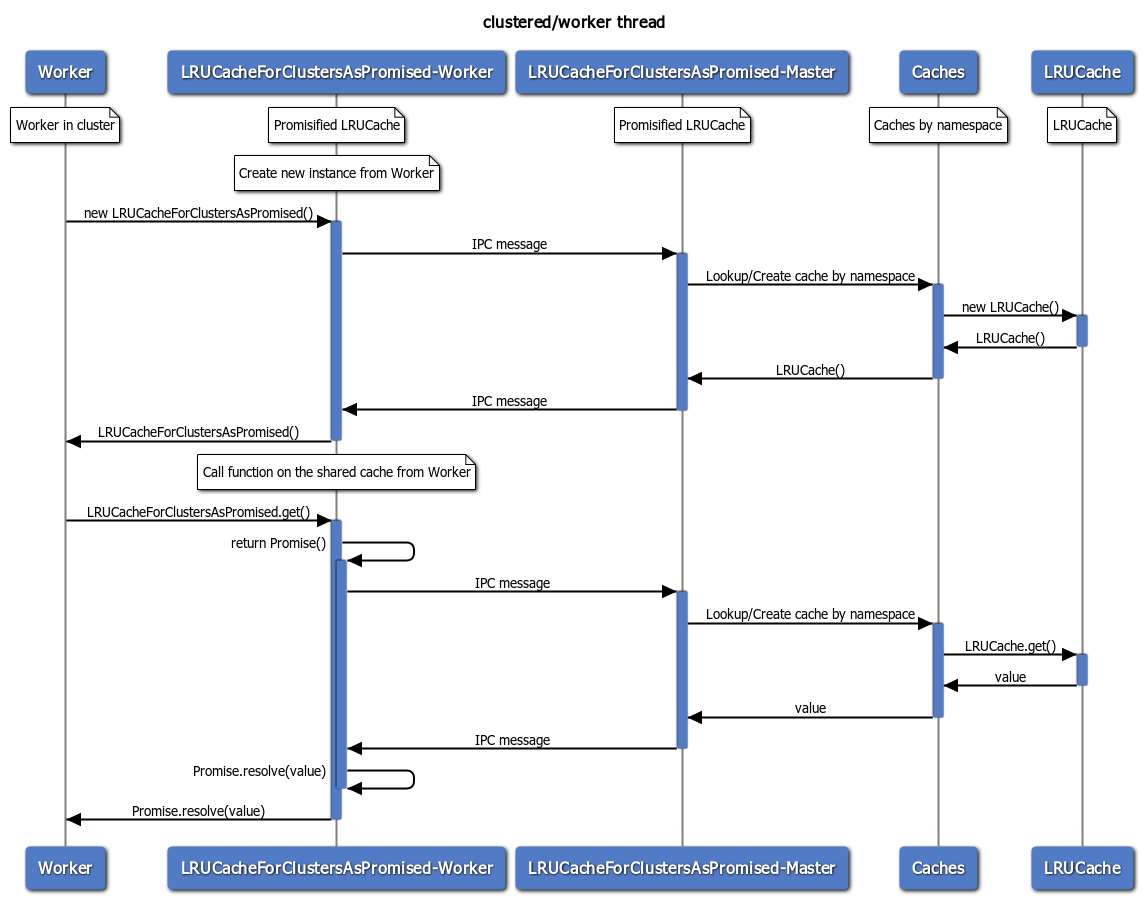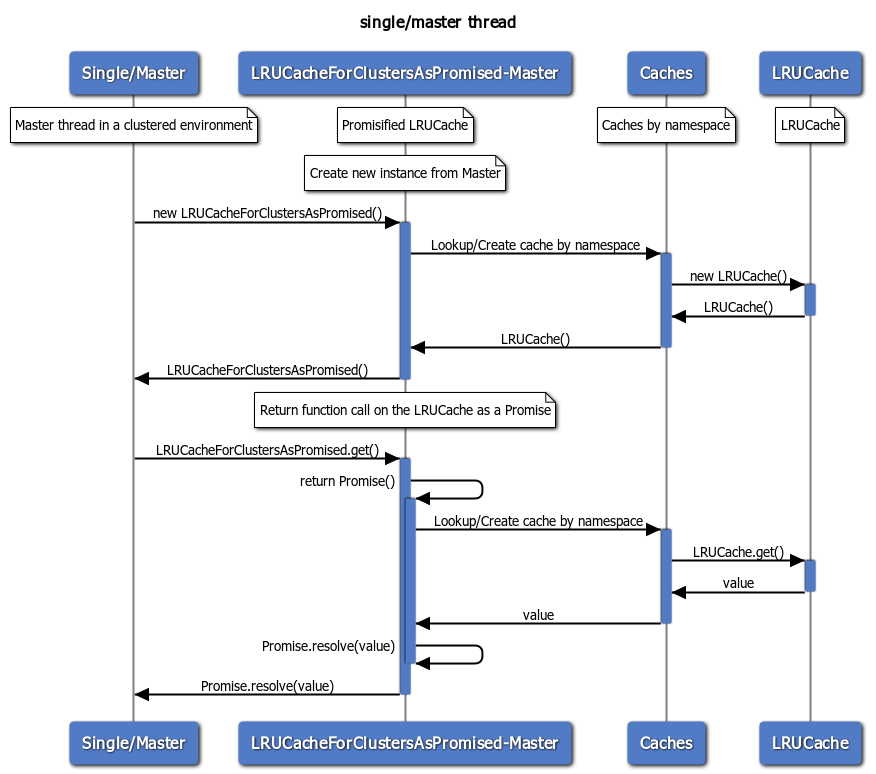lru-cache-for-clusters-as-promised







LRU Cache for Clusters as Promised provides a cluster-safe lru-cache via Promises. For environments not using cluster, the class will provide a Promisified interface to a standard lru-cache.
Each time you call cluster.fork(), a new thread is spawned to run your application. When using a load balancer even if a user is assigned a particular IP and port these values are shared between the workers in your cluster, which means there is no guarantee that the user will use the same workers between requests. Caching the same objects in multiple threads is not an efficient use of memory.
LRU Cache for Clusters as Promised stores a single lru-cache on the master thread which is accessed by the workers via IPC messages. The same lru-cache is shared between workers having a common master, so no memory is wasted.
When creating a new instance and cluster.isMaster === true the shared cache is checked based on the and the shared cache is populated, it will be used instead but acted on locally rather than via IPC messages. If the shared cache is not populated a new LRUCache instance is returned.
install
npm install --save lru-cache-for-clusters-as-promised
options
namespace: string, default "default";
- The namespace for this cache on the master thread as it is not aware of the worker instances.
timeout: integer, default 100.
- The amount of time in milliseconds that a worker will wait for a response from the master before rejecting the
Promise.
failsafe: string, default resolve.
- When a request times out the
Promise will return resolve(undefined) by default, or with a value of reject the return will be reject(Error).
max: number
- The maximum items that can be stored in the cache
maxAge: milliseconds
- The maximum age for an item to be considered valid
stale: true|false
- When
true expired items are return before they are removed rather than undefined
prune: false|crontime string, defaults to false
- Use a cron job on the master thread to call
prune() on your cache at regular intervals specified in "crontime", for example "*/30 * * * * *" would prune the cache every 30 seconds. Also works in single threaded environments not using the cluster module.
! note that length and dispose are missing as it is not possible to pass functions via IPC messages.
api
set(key, value, maxAge)
- Sets a value for a key. Specifying the
maxAge will cause the value to expire per the stale value or when pruned.
mSet({ key1: 1, key2: 2, ...}, maxAge)
- Sets multiple key-value pairs in the cache at one time.
mSetObjects({ key1: { obj: 1 }, key2: { obj: 2 }, ...}, maxAge)
- Sets multiple key-value pairs in the cache at one time, where the value is an object.
get(key)
- Returns a value for a key.
mGet([key1, key2, ...])
- Returns values for multiple keys, results are in the form of
{ key1: '1', key2: '2' }.
mGetObjects([key1, key2, ...])
- Returns values as objects for multiple keys, results are in the form of
{ key1: '1', key2: '2' }.
peek(key)
- Returns the value for a key without updating its last access time.
del(key)
- Removes a value from the cache.
mDel([key1, key2...])
- Removes multiple keys from the cache..
has(key)
- Returns true if the key exists in the cache.
incr(key, [amount])
- Increments a numeric key value by the
amount, which defaults to 1. More atomic in a clustered environment.
decr(key, [amount])
- Decrements a numeric key value by the
amount, which defaults to 1. More atomic in a clustered environment.
reset()
- Removes all values from the cache.
keys()
- Returns an array of all the cache keys.
values()
- Returns an array of all the cache values.
dump()
- Returns a serialized array of the cache contents.
prune()
- Manually removes items from the cache rather than on get.
length()
- Return the number of items in the cache.
itemCount()
- Return the number of items in the cache - same as
length().
max([max])
- Get or update the
max value for the cache.
maxAge([maxAge])
- Get or update the
maxAge value for the cache.
stale([true|false])
- Get or update the
stale value for the cache.
example usage
const LRUCache = require('lru-cache-for-clusters-as-promised');
LRUCache.init();
const LRUCache = require('lru-cache-for-clusters-as-promised');
const cache = new LRUCache({
namespace: 'users',
max: 50,
stale: false,
timeout: 100,
failsafe: 'resolve',
});
const user = { name: 'user name' };
const key = 'userKey';
cache.set(key, user)
.then(() => {
console.log('set the user to the cache');
return cache.get(key);
})
.then((cachedUser) => {
console.log('got the user from cache', cachedUser);
return cache.length();
})
.then((size) => {
console.log('user cache size/length', size);
return cache.reset();
})
.then(() => {
console.log('the user cache is empty');
return cache.itemCount();
})
.then((size) => {
console.log('user cache size/itemCount', size);
});
process flow
Clustered cache on master thread for clustered environments

Promisified for non-clustered environments






